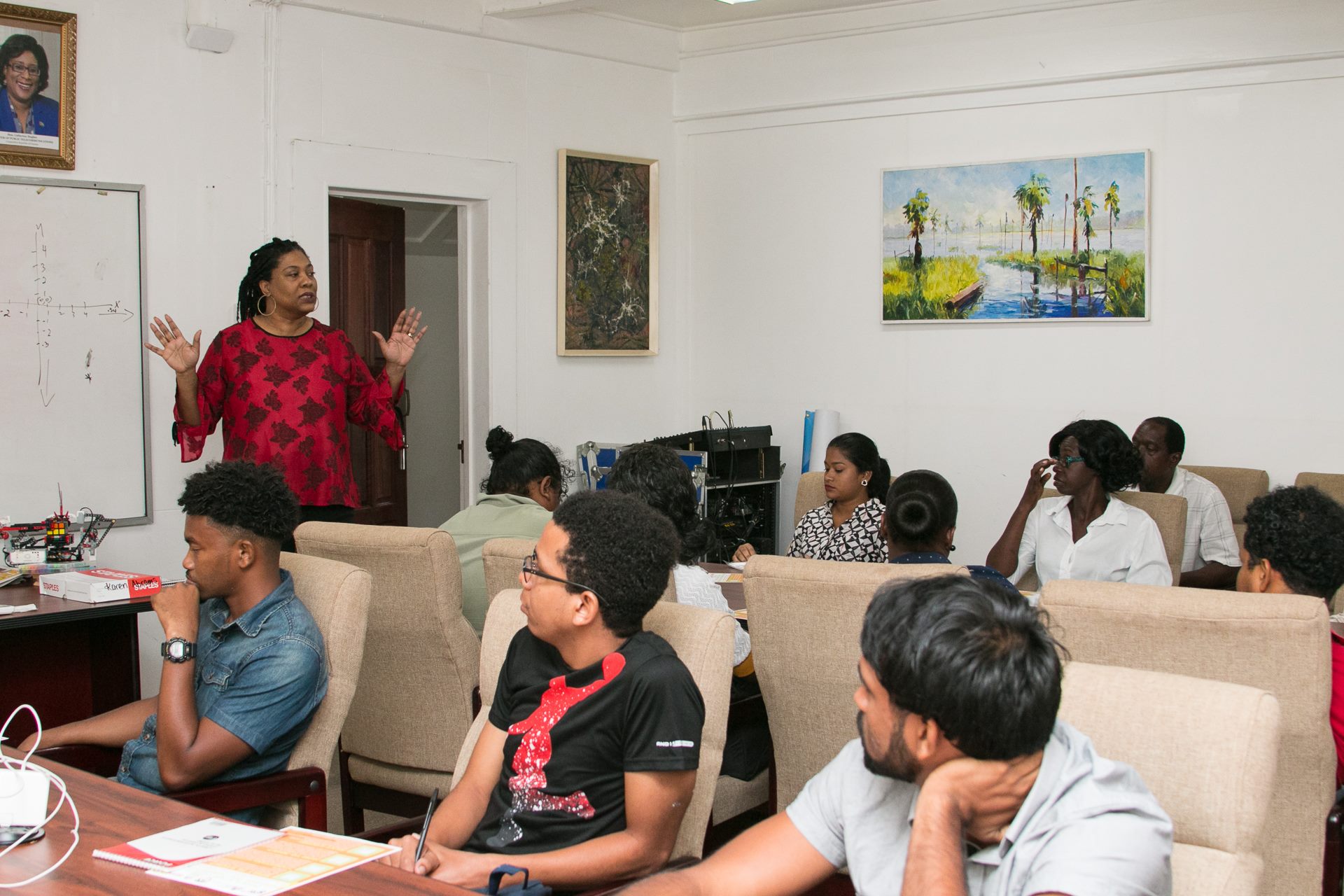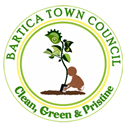Bartica teachers, community reps receive STEM training for ‘green’ development

Bartica teachers, community reps receive STEM training for ‘green’ development
Twelve teachers from Bartica, along with four community stakeholders, today, underwent a one-day training workshop in Science, Technology, Engineering, Mathematics (STEM) and Robotics, aimed at equipping them with technological skills, which can assist in providing modern solutions to the challenges of transitioning Bartica, Cuyuni-Mazaruni (Region Seven) to the first model ‘green’ town in Guyana and the Caribbean.
The training, which also saw the participation of five other persons, drawn from the Lusignan/Good Hope Learning Centre and The Deaf Association of Guyana, who are training to become STEM Guyana Club Coaches, is a collaborative effort between the Office of Climate Change (OCC), Ministry of Education, the Ministry of Public Telecommunications and the STEM Guyana, was held in the Ministry of Public Telecommunications Boardroom and facilitated by Founder of STEM Guyana, Ms. Karen Abrams and her daughter, Ms. Imah Abrams.
Noting that robotics itself offers innovative possibilities for developing waste management and energy generation solutions among other things, Project Manager of the Bartica Transitioning to National Energy Security Project, Mr. Gavin Bovell, explained in an invited comment that the OCC is cognisant of the fact that science and technology play a critical role in developing solutions to many common issues. Taking this into context, he said that the OCC in June 2017, launched a US$650,000 pilot project, for the purpose of establishing a reliable point of reference for the existing state of energy use in Bartica.
 The financing was received from the Government of Italy in support of the Model ‘Green’ Town, Bartica Project. The data generated from this project will be used for future measurements and predictions for evidence-based decision-making and pursuance of projects and programmes. One of the components of the five-component project focused on sensitisation and awareness among the populace. It is in this context, he said that the project was born, to not only raise awareness but also equip the residents, particularly students with the relevant skills to help find viable solutions.
The financing was received from the Government of Italy in support of the Model ‘Green’ Town, Bartica Project. The data generated from this project will be used for future measurements and predictions for evidence-based decision-making and pursuance of projects and programmes. One of the components of the five-component project focused on sensitisation and awareness among the populace. It is in this context, he said that the project was born, to not only raise awareness but also equip the residents, particularly students with the relevant skills to help find viable solutions.
“For the sensitisation, what we planned to do is to go into schools and have hands-on activities. So we thought it interesting and timely that the STEM Guyana team was here in Guyana already and so we decided to collaborate to sponsor 16 persons to be trained so that they can go back into their communities and schools and train students. We believe that this is important because the kids can go back into their communities and come up with solutions using the applied skills that they would have received that they can come up with their own solutions,” he said.
The pilot project, under which today’s workshop falls, is divided into two phases. In phase one, which is currently being implemented over a period of 12 months, energy audits and public awareness exercises are being completed, along with the establishment of an energy data management centre. To the degree possible, some small-scale demonstrations have also commenced. In phase two the information gathered will be used for the scale up of projects.
Ms. Abrams, in an invited comment, said the STEM Guyana is pleased to be a part of the project. She noted that if Guyana is to fast track its development and compete globally, it is important that citizens be exposed to such programmes so that they can formulate solutions to solve issues ranging from the environment to agriculture to health care.
The younger Ms. Abrams echoed these sentiments noting that citizens can be empowered through technology to find solutions to everyday problems. “We want to prepare and empower them to utilise technology to develop dynamic solutions to problems they face within their communities and so this morning, we really want to hammer home that. We will be focusing on the coach platform, judge system, scratch programming, help them to create animations, the fundamentals of robotics and programming of robots,” she said.
One of the participants, Mr. Ron Ghanie, a teacher from the Three Miles Secondary School, said that while he is not versed in Information Technology he is looking forward to leaving Georgetown with the knowledge and skills to help make a change in his community. “I do not know much about scratch programming [a free programming language and online community, which allows persons to create their own interactive stories, games, and animations] but I am looking to take that away with me. I hope that when I get back to Bartica, I can inspire my students to partake in activities that we can embark on. This is a really, really great idea,” he said.
Source: MOTP
